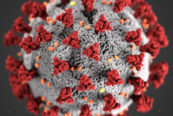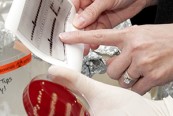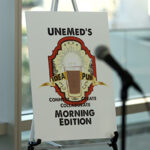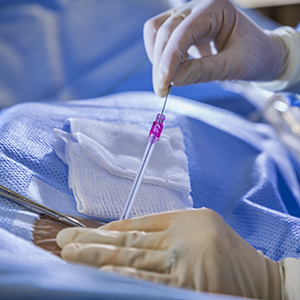OMAHA, Nebraska (June 24, 2019)—Gus Wang, PhD, a world-leading expert on antimicrobial peptides, published a field-altering discovery in the Proceedings of the National Academy of Sciences, widely regarded as one of the most prestigious academic journals.
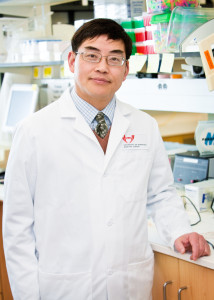
Using Dr. Wang’s world-renown peptide database, the UNMC team deduced previously unknown peptide properties that govern efficacy inside a living animal.
Researchers have long known that antimicrobial peptides have therapeutic potential against antibiotic-resistant bacterial infections, particularly with topical treatments for things like skin infections. Unfortunately the tiny protein fragments are also fragile, and are much less effective inside the body for things like blood infections.
But bacteria are also less likely to develop resistance to peptides. Researchers around the world have long looked at antimicrobial peptides as a potential solution to resistance.
Until now, it seems, no one has been able to make antimicrobial peptides work in a broad, therapeutic way.
“Researchers have largely been so excited with the potential of these peptides for treating infections that they rushed forward with efficacy testing and clinical trials,” Dr. Wang said. “This paper is important to the field because it suggests that certain peptides are less sticky to host cells, and therefore are more likely to work [inside a living organism]. This exciting discovery represents a paradigm shift in antimicrobial peptide design, and may lead to novel peptides with broader therapeutic potential.”
Dr. Wang and his team designed an algorithm to identify and classify numerous antimicrobial peptide properties. From this algorithm, Dr. Wang and his postdoctoral fellow, Biswajit Mishra, PhD, were able to design and test idealized peptide sequences against the most notorious drug-resistant pathogens. That work was previously published in the Journal of the American Chemical Society.
With high-efficacy candidates in hand, they systematically altered the peptide sequences, one amino acid at a time, and repeated efficacy testing. They also effectively tested their spectrum of sequences in a mouse model of systemic infection, with the help of postdoc Jayaram Lakshmaiah Narayana, PhD
Dr. Wang’s results were published in the online version of the Proceedings of the National Academy of Sciences of the United States. The article can be viewed here: https://www.pnas.org/content/early/2019/06/12/1821410116.
His method of designing systemically active peptides—along with the initial key amino acid sequences—is in the patent process through UNeMed, the technology transfer and commercialization office at UNMC and UNO. Several pharmaceutical companies have expressed interest in the technology as a therapeutic for both human and animal health.
But for now, next steps include a few more years of small and large animal research before testing can move into human patients.


